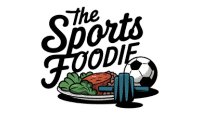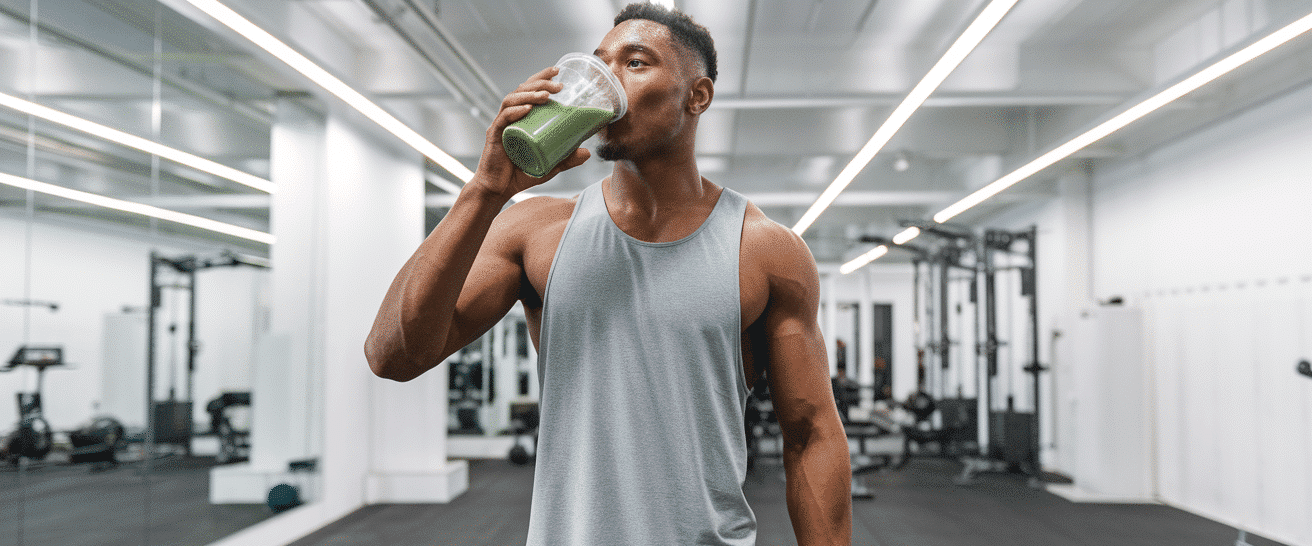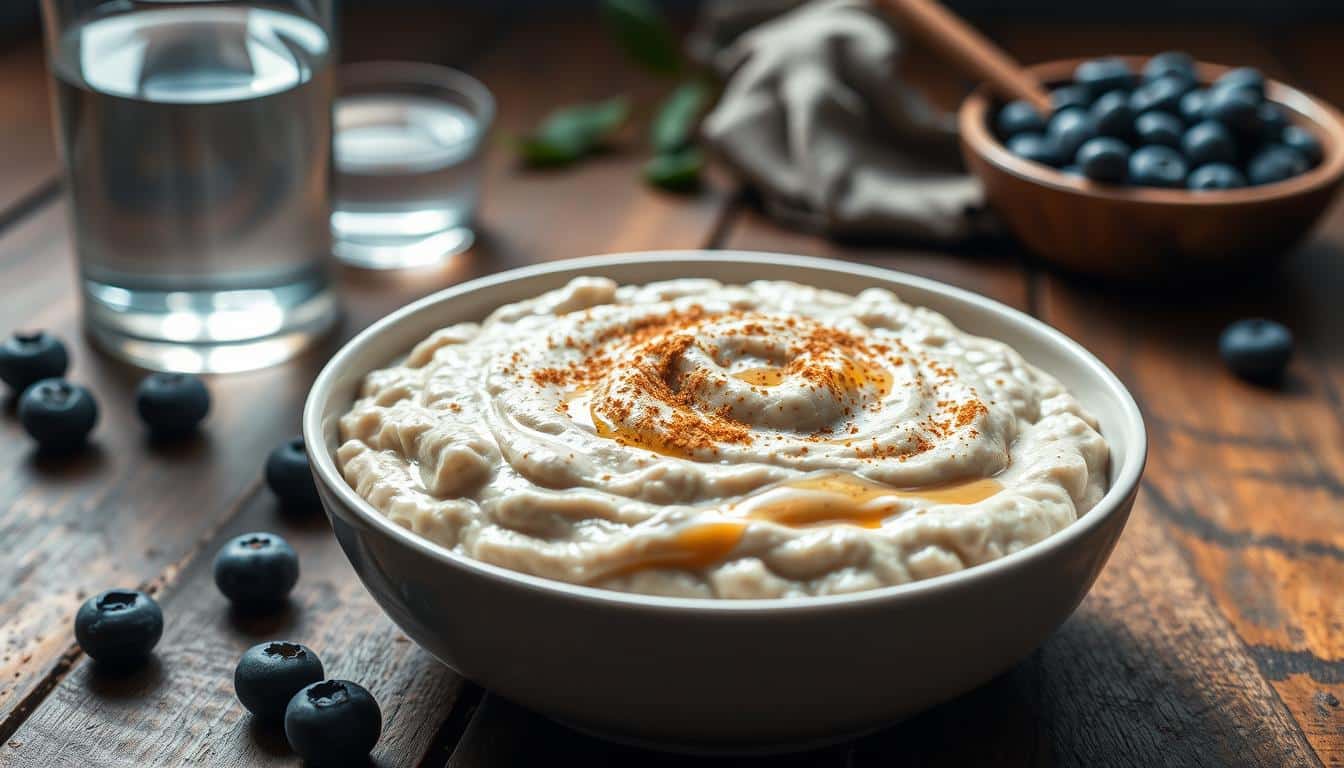Ever wondered if your pre-workout meal is helping or hindering your performance? Choosing the right fuel can make all the difference. Oats, a whole-grain powerhouse, are packed with carbs, fiber, and even a bit of protein—making them a popular choice for many fitness enthusiasts.
But are they the best option for your fitness goals? Whether you’re aiming for fat loss or peak performance, understanding how oats work as pre-workout fuel is key. They provide sustained energy, thanks to their fiber content, and even include essential fats to support your joints during exercise.
Ready to learn more? Let’s dive into the pros and cons of starting your workout with a bowl of oats.
Why Oatmeal is a Great Pre-Workout Meal
Looking for a pre-workout meal that keeps you energized without the crash? Oats are packed with the right nutrients to fuel your fitness goals. They’re a balanced mix of carbs, protein, and healthy fats, making them a top choice for active individuals.
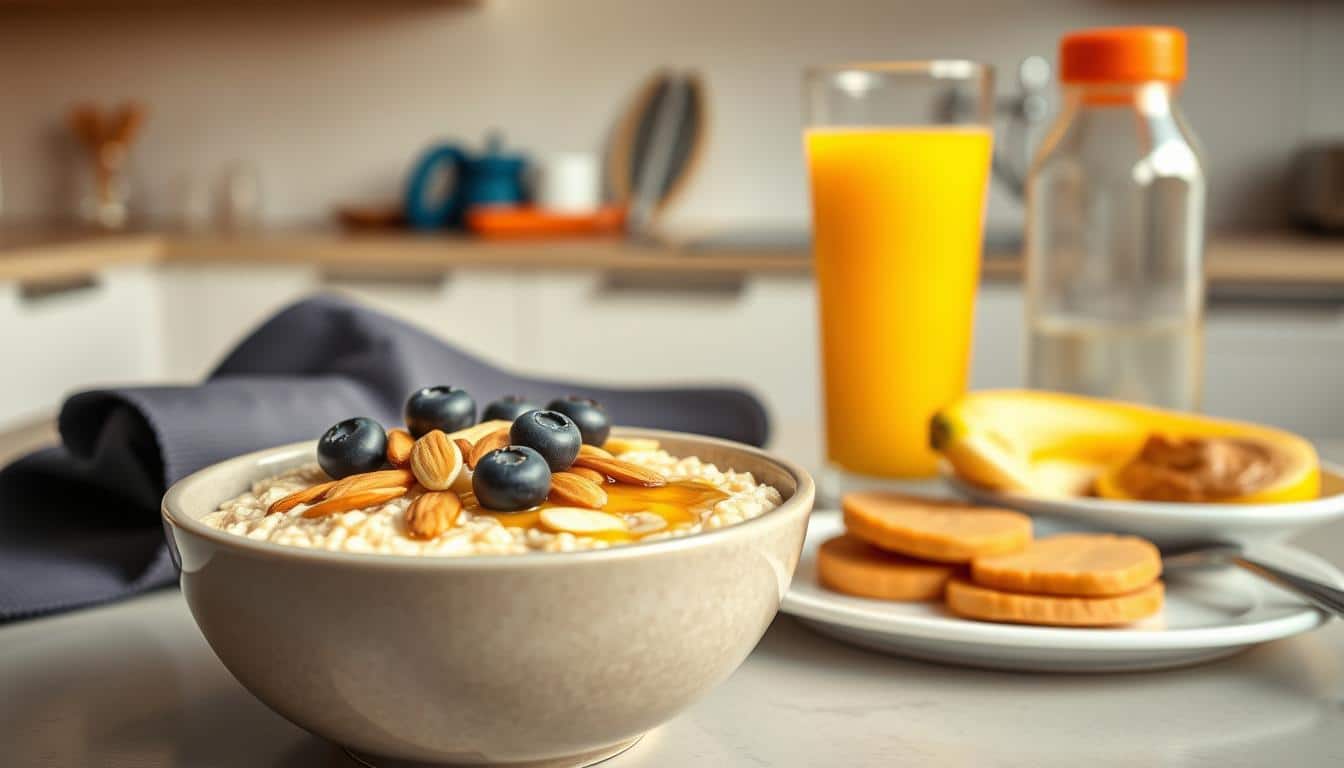
Oats are about 66% carbs, which provide steady energy. They also contain 17% protein and 7% fats, supporting muscle repair and joint health. Unlike simple carbs like bananas or toast, oats have a low glycemic index. This means they release energy slowly, preventing blood sugar spikes and crashes.
You can customize your bowl to match your fitness goals. Add fruits for extra vitamins, nuts for healthy fats, or a scoop of protein powder for muscle support. Just be careful not to overeat—too much can leave you feeling sluggish during your workout.
With oats, you get a meal that’s not only nutritious but also versatile. Whether you’re training for endurance or strength, they’re a reliable way to fuel your body and stay on track.
How Oatmeal Fuels Your Workout
Want to know how to fuel your body for better performance? Oats are a fantastic choice because they provide both energy and support for your muscles. Let’s break down how they work to keep you going strong.
Complex Carbs for Energy
Oats are rich in complex carbs, which release energy slowly. This helps you avoid sudden crashes during your training. Unlike sugary snacks, they keep your blood sugar stable, so you can stay focused and active longer.
Protein for Muscle Support
With 11.1g of protein per 100g, oats are a solid plant-based option for muscle repair. Adding Greek yogurt (17g protein per cup) can boost this even further. The amino acids in oats also help reduce soreness after exercise, making recovery smoother.
Here’s a quick comparison of protein sources:
| Source | Protein (per 100g) |
|---|---|
| Oats | 11.1g |
| Greek Yogurt | 10g |
| Whey Protein | 80g |
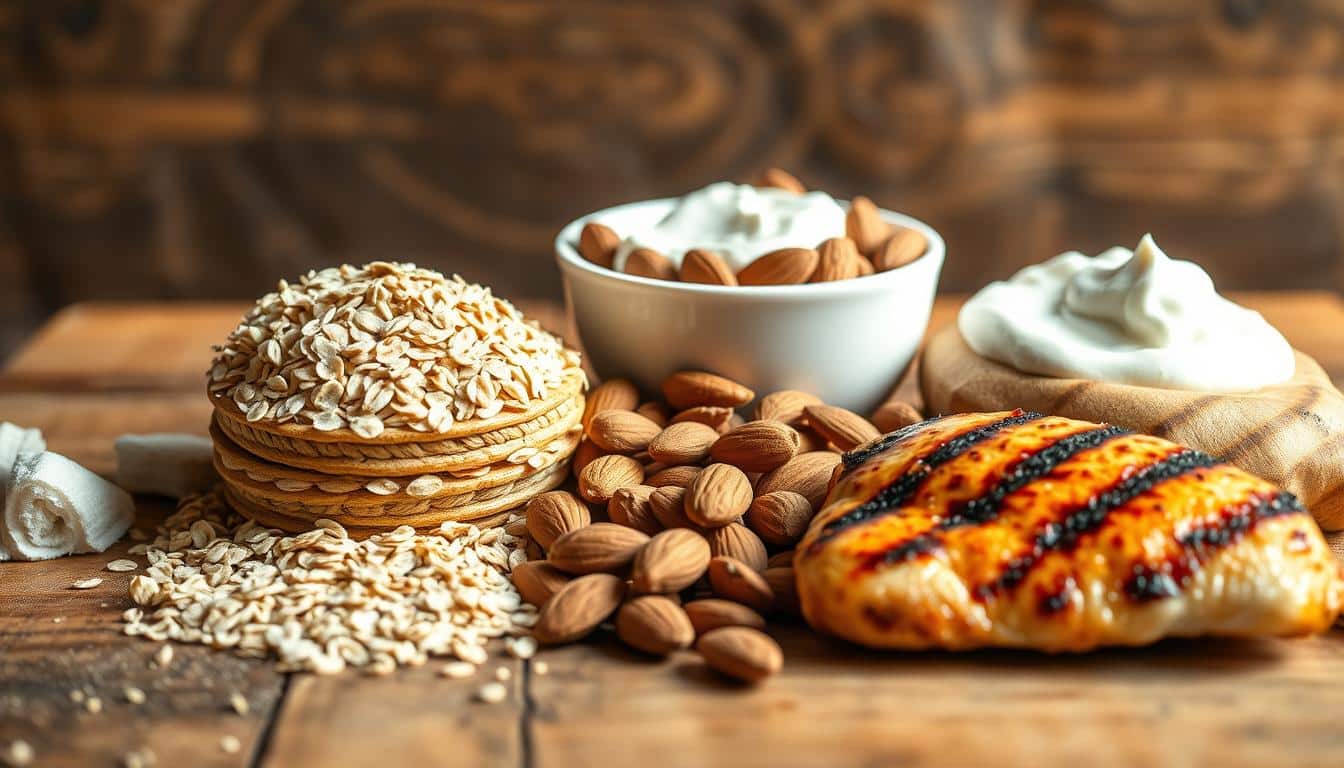
For active individuals, aim for 0.7-1g of protein per pound of body weight. Whether you choose oats or whey, both can help you meet your goals. For more ideas, check out these healthy desserts for athletes.
Oatmeal Before Workout Benefits
Ready to discover how the right meal can boost your training? Starting your session with a bowl of oats can offer multiple advantages. Let’s explore why this whole-grain option is a favorite among fitness enthusiasts.
One key component in oats is beta-glucan, a type of soluble fiber. It helps extend your workout duration by providing steady energy. This is especially useful for endurance activities like running or cycling.
Oats are also rich in iron, which plays a crucial role in oxygen transport. This is vital for high-intensity interval training (HIIT) or any activity that demands quick bursts of energy. A study even found that athletes who included oats in their diet improved their 5K times by 4%.
Hydration is another benefit. Oats absorb water, helping you stay hydrated during summer workouts. This can prevent fatigue and keep you performing at your best.
Finally, oats keep you feeling full, preventing mid-workout hunger cramps. This means you can focus on your training without distractions. For more ideas on high-energy meals, check out these high-energy breakfast foods for athletes.
With these health benefits, oats are a smart choice for anyone looking to optimize their energy levels and support muscle recovery. Whether you’re a casual gym-goer or a pro athlete, they’re a reliable way to fuel your body.
When to Eat Oatmeal Before a Workout
Timing your meals can make or break your training session. To get the most out of your eat workout routine, aim to consume oats 1-3 hours beforehand. This gives your body enough time to digest and convert the nutrients into energy.
If you’re eating less than 45 minutes before your hour workout, opt for simple carbs like a banana or toast. These are easier to digest and provide quick energy without weighing you down.
- 3 hours before: A larger portion works well for a full meal.
- 1 hour before: Stick to a smaller portion to avoid feeling heavy.
- 30 minutes before: Blend oats into a smoothie for easy digestion.
It’s important eat mindfully. Avoid high-fat toppings like peanut butter if you’re eating less than an hour before your session. These can slow digestion and leave you feeling sluggish.
For early risers, try eat overnight oats. They’re convenient, prepped the night before, and perfect for pre-6am workouts. A good portion guide is 1/2 cup of dry oats for a 150-lb athlete.
By timing your meals right, you’ll fuel your body effectively and perform at your best.
Oatmeal Recipes for Pre-Workout Meals
Need a quick and nutritious meal to power up your training? Oats are a versatile base for creating delicious and energy-packed dishes. Here are two easy recipes to fuel your body and keep you going strong.
Classic Oatmeal with Toppings
Start with a bowl of classic oats for a simple yet effective meal. Cook 1/2 cup of oats with water or milk until creamy. Top it with your favorite add-ons for extra flavor and nutrients.
- Fruits: Add sliced bananas, berries, or apples for natural sweetness and vitamins.
- Nuts: Sprinkle almonds or walnuts for healthy fats and crunch.
- Protein boost: Stir in a scoop of vanilla protein powder for muscle support.
This meal provides around 400-500 calories, making it perfect for a pre-training boost.
Overnight Oats
For a no-fuss option, try overnight oats. Combine 1/2 cup of oats, 1 cup of milk (or dairy-free alternatives like almond milk), and 1 tablespoon of chia seeds in a jar. Mix well and refrigerate for at least 6 hours.
Customize your jar with these ideas:
- Dairy-free: Use coconut yogurt for a creamy, plant-based version.
- Protein-packed: Add a scoop of vanilla protein powder for an extra 25g of protein.
- Sweet touch: Drizzle honey or maple syrup for natural sweetness.
This recipe is perfect for busy mornings and provides steady energy for your workout.
| Recipe | Calories (per serving) |
|---|---|
| Classic Oatmeal with Toppings | 400-500 kcal |
| Overnight Oats | 400-500 kcal |
Both recipes are easy to prepare and packed with nutrients to keep you energized. Whether you prefer a warm bowl or a chilled jar, these meals are a great way to start your day right.
How Oatmeal Supports Muscle Recovery
Ever thought about how your post-workout meal impacts recovery? What you eat after training plays a big role in repairing muscles and reducing soreness. Oats are a fantastic choice because they’re packed with nutrients that support recovery.
The post-workout window is crucial. Eating within 30-45 minutes after exercise helps your body rebuild and refuel. Oats provide protein, which aids in muscle repair, and magnesium, which prevents cramps. With 56mg of magnesium per 100g, oats are a natural way to keep your muscles relaxed.
Here’s a simple recipe to try: mix oats with chocolate milk. This combo gives you the perfect balance of carbs and protein for recovery. It’s quick, delicious, and effective.
| Ingredient | Benefits |
|---|---|
| Oats | Provides protein and magnesium for muscle repair |
| Chocolate Milk | Offers carbs and protein for quick recovery |
Studies show that athletes who include oats in their diet experience 18% less delayed onset muscle soreness (DOMS). This means less pain and faster recovery after intense workouts.
Whether you’re lifting weights or running miles, oats are a reliable way to support your body. They’re easy to prepare, versatile, and packed with nutrients that help you bounce back stronger.
Oatmeal vs. Other Pre-Workout Foods
Curious how oats stack up against other pre-workout options? Let’s break it down. Whether you’re grabbing a banana, rice cake, or protein bar, each has its pros and cons. Here’s how oats compare.
First, let’s talk nutrition. Oats are a source of complex carbs and fiber, providing steady energy. A banana offers quick carbs but lacks the fiber to keep you full. Rice cakes are light but low in nutrients. Protein bars are convenient but often packed with added sugars.
Cost is another factor. Oats cost about $0.25 per serving, making them budget-friendly. Protein bars can run up to $2 each, which adds up quickly. Bananas and rice cakes fall somewhere in between, but oats still win for value.
Digestion matters too. Oats are gentle on the stomach and cause less bloating than lentils or heavy protein bars. This makes them a reliable choice for sensitive eaters.
Finally, taste versatility sets oats apart. You can go savory with eggs or sweet with honey and fruit. Bananas and rice cakes are limited in flavor options, while protein bars often taste artificial.
When it comes to pre-workout foods, oats are a top contender. They’re nutritious, affordable, easy to digest, and endlessly customizable. Whether you’re fueling for a run or a lift, they’re a smart choice.
Conclusion
Fueling your body right can transform your fitness journey. Oats are a simple yet powerful choice to support your fitness goals. They provide steady energy, aid in recovery, and are easy to prepare—making them a go-to for active individuals.
Experiment with timing and toppings to find what works best for you. Track how your body responds to see the difference it makes in your workout performance. Small tweaks can lead to big results.
Ready to give it a try? Start tomorrow with our berry oats recipe and feel the difference. Your body will thank you!
